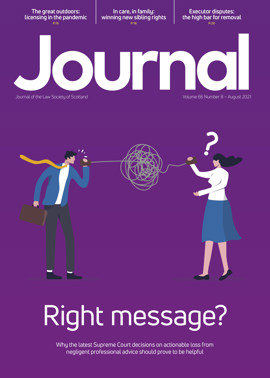Opinion: Andrew Stevenson
The Scottish Government’s consultation on “Complaints against lawyers and legal firms in Scotland” closed on 20 February. The Scottish Law Agents’ Society lodged one of many responses. The analysis of responses was published in July.
On the whole SLAS favours the proposals, although many lack the detail necessary to enable a concluded view to be expressed. Those proposed measures which would accelerate the complaints process are indeed to be welcomed, assuming that they are accompanied by appropriate safeguards. It is a sensible proposal, for example, that where a lawyer offers a reasonable sum in settlement at an early stage, a complaint process could be terminated whether the complainer likes it or not.
Some of the proposals do give rise to serious concerns, however.
First, hybrid issue complaints were declared incompetent by the Inner House in Anderson Strathern v SLCC 2016 SLT 967. SLAS opposes the proposal now to admit this species of complaint, because it increases the potential compensation payable by solicitors. The consultation acknowledges that admitting hybrid complaints would “impact on legal services providers who could then be subject to both disciplinary and compensatory outcomes if a complaint is upheld”.
This expansion, amounting to double jeopardy, represents a further encroachment by a system running in parallel to the sheriff courts but in which claimants never have to pay expenses and in which there is no recourse to the sheriff or the Sheriff Appeal Court. Under both the 1980 and 2007 Acts, all appeals lie only to the Court of Session. Deep pockets may be required; it is as if the Courts Reform (Scotland) Act 2014 never happened.
Currently, complainers may recover compensation of as much as £5,000 from the Law Society or the Discipline Tribunal in a conduct complaint, or as much as £20,000 from the SLCC in a service complaint. One can justify a complaints process remote from the courts where it is dealing with low value claims. Yet even the SLCC’s existing powers admit claims that are by no means low; hybrid complaints will inflate them further. Claims of that magnitude belong in court. It is ironic that a lawyer facing a claim for compensation is excluded from the same sheriff court in which they are entitled to represent another citizen faced with a similar claim for damages for negligence, breach of fiduciary duty or similar.
Secondly, the consultation refers, with apparent approval, to the principle that “polluter pays”. However, this approbation rings hollow when we consider that under the present system the polluting complainer never pays and there is no commitment to change that.
It was because SLAS sees the unfairness in this scot-free pollution that it has previously proposed that a modest sum such as £50, refundable in the event of success, be paid by those inclined to complain. It is irrational that a client who sues a lawyer for £5,000 has to pay the sheriff clerk £109, whereas a potentially far higher value complaint to the SLCC costs the quasi-pursuer nothing whatsoever, and with no risk of a liability in costs, even if the complaint is frivolous, vexatious or without merit. So too in an argument with someone other than a client. So, for example, in a dispute over fees due to an expert instructed on behalf of a client, it is not uncommon for the expert to threaten to complain to the SLCC rather than litigate in the sheriff court.
Thirdly, the consultation raises the possibility that, to facilitate “informed consumer choice” in the instruction of legal services, publicity could be given to solicitors about whom complaints are made (even if such prove to be baseless, it would seem). Naming and shaming lawyers in these circumstances is wrong. Clients may be mad, bad or dangerous to know, feeling wronged and resentful even before their initial meeting with a lawyer. That is not the solicitor’s fault. Some areas of practice, such as defending those facing bankruptcy or eviction, are inherently risky and stressful, often ending badly despite the best endeavours of the agent. Also, the citizen who is perceived as being a complaint in waiting may struggle to engage a solicitor at all. If the fact of their having complained to the SLCC is to be made public too, the sound of alarm bells will merely be amplified.
Many of the proposals in this consultation are to be welcomed. More than anything, however, it would be refreshing to have some time without endless and proliferating reviews, reports and research exercises whereby the increasingly wearisome topic of regulation never settles down or goes away.
Regulars
Features
Briefings
- Criminal court: Sentencing deconstructed
- Family: Litigation and lottery wins
- Human rights: Reinforcing the right to be forgotten
- Pensions: Plugging the LGPS exit credit hole
- Criminal law: The future of sexual offence trials
- Scottish Solicitors' Discipline Tribunal
- Property: Heat networks: the key to low-carbon heating?
- In-house: Power of the nudge






